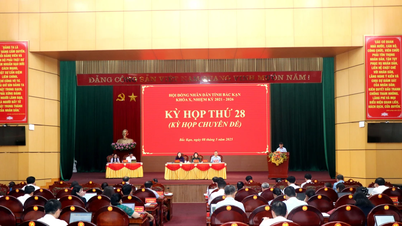Video: A week of infiltrating the 'den' of a loan company via app, heart-stopping scenes of debtor threats
Part 1: The fearful life of a male student caught up in the 'app-on-app' loan matrix
Part 2: In the 'den' of loan apps 'strangling' debtors
Part 3: Penetrating the Oncredit app system: Many dangerous permissions are used
In addition to making terrorist calls and threatening to embarrass debtors as we mentioned in previous articles, Oncredit Financial Investment Consulting Company Limited (Oncredit Company or Oncredit App) has also received backlash from many people for what they consider to be loan slander.
Mr. NDXB (living in Ho Chi Minh City) said that in December 2021, someone called him to inform him that he had a debt of 12 million VND that needed to be paid to Loi Tin Oncredit Trading and Service Company Limited. He had never borrowed money before, and seeing that the caller's profile had many incorrect details, Mr. B. determined that the call was a scam.
About 5 months later (May 2022), Mr. B. began receiving debt collection messages with continuous frequency and threatening content. Identifying it as a scam organization, Mr. B. ignored it and did not respond.

Never having borrowed money, Mr. NDXB was still falsely accused of debts from Oncredit.
"After that, there was a message from Loi Tin announcing that he would sell this package to another organization (like the mafia) and started sending threatening messages. I don't know how they got my family's phone number and sent threatening messages...", said Mr. B. The incident was later reported to the local police, but the response was "difficult to resolve".
According to the information about the debt that Mr. B. was accused of, with the initial loan amount of 6.5 million VND, after 139 days (4 and a half months), the amount Mr. B. had to pay was nearly 11.2 million VND. This means that the interest rate (including the costs incurred by the lender) is up to about 150%/month.
"The way to get out of it is to be strong, save yourself first, and stop answering strange phone calls. Until now, I still receive threatening messages from time to time," said Mr. B.

Responding to reporters, a representative of the Cyber Security and High-Tech Crime Prevention Department - Ho Chi Minh City Police (PA05) said that recently, the unit has coordinated with related forces to destroy a series of loan apps that defraud and terrorize borrowers.
In addition to the loan apps that have been destroyed, many similar models have also been investigated. Analyzing the debt collection behavior with the method of psychologically terrorizing borrowers online and through phone calls, the PA05 representative said that, in essence, there is a close connection with illegal credit activities. This is a form of transformation from traditional illegal credit.
Black credit subjects thoroughly exploit the operating environment to approach more victims. To deal with the authorities, instead of lending money directly in cash, black credit gangs on the internet often hide under the names of financial companies, technology companies, law consulting companies, etc., from which they release applications and websites for online usury and organize buying, selling, debt collection, and debt recovery in the form of psychological terror for borrowers and their relatives.
In addition to hiding under the guise of legal names, in order to reach many victims, these subjects use cyberspace as an effective advertising channel, from which they set up "honey traps that kill flies" such as: low interest rates, quick disbursement, no need to meet in person, no need to mortgage assets... From these attractive invitations, many people have been lured into a continuous spiral of black credit, with no way out, and no ability to pay.
“There are cases where victims initially borrowed only a few million VND to meet their consumption needs, but now owe hundreds of millions of VND and are unable to pay,” a PA05 representative gave an example.
Regarding why the lenders know detailed information about the borrowers and their relatives, this person said that in fact, it is because the borrowers themselves hand over and give the information to the lenders. Nearly 80% of what the debt collectors have is because the borrowers hand over the information without their knowledge.
Specifically, when borrowers fill in their personal information when applying for a loan, all applications on the app and website require borrowers to fill in information such as: portrait photo, full name, year of birth, contact information, place of residence, citizen identification photo, social network accounts...
More sophisticatedly, when borrowers download loan apps, the apps will ask for permission to exploit data on the borrower's mobile phone such as: Contacts, phone memory, images and other data... Then, they will collect important data of the borrower.
The subjects will only agree to lend when the borrower agrees to the above requirements. This agreement means that the borrower will fall into a chain trap, long-term danger, not only affecting themselves but also their families, and those around them will also be caught up in that vortex. The borrower's sensitive information will be exploited to put mental pressure, force them to repay the loan, borrow more...
Criminals also contact victims' relatives to offer loans, force them to repay debts, and even buy and sell to other credit gangs to put borrowers in a loop, making them unable to pay.
Authorities searched Mirae Asset Finance Company.
There are many cases where people only apply for a loan but decide not to borrow, or their loan application is not approved but they are still asked to pay the debt. This is because the subjects use the information provided by the borrower when applying to assign debt, fabricate the debt to put the victim on the path of black credit debt.
From the information the borrower fills out when applying for a loan, the subjects will expand their search for the borrower's personal information on social media accounts such as photos of daily life, work photos, family memories, etc. They will narrow down the borrower's relationships, place of residence and characteristics to serve the purpose of debt collection in the form of terrorism when necessary.
As for the borrower granting access to the phone, they will copy all the borrower's data to their server. Then, select the necessary information.
“For example, if the borrower saves the names of their parents or spouse in their contacts, they will save them. There are cases where the victim saved sensitive 18+ photos that were collected by them, then used to threaten to force them to pay their debts, or even blackmail and extort property,” said a representative of PA05.
When starting to apply for a loan, the lenders are very professional, caring, and gentle... but after taking out the loan, the borrower realizes that he or she has fallen into a trap.
Oncredit employees lose sleep when "brother company" is "caught" by the police
Accordingly, the debt collection terrorism journey will take place very quickly, just a few days after the loan starts, or even when you do not have any loan. The levels of terrorism range from low to high. The mild level is texting to ask about the borrower with content about the consequences if the debt is not paid. The next level is calling and texting to terrorize the borrower's relatives with insulting and defamatory language to force debt repayment.
More complicatedly, they cut and paste images of the borrower's parents, children, and friends with slanderous content, in order to put mental pressure on the borrower and everyone around them. Most dangerously, they also force the victims to take out new loans, sell the debt to other black credit gangs, causing the victims to owe more debt, interest on interest, and lose the ability to pay.

Responding to VTC News , lawyer Phan Hoa Nhut (Ho Chi Minh City Bar Association) said that in the case of Oncredit Company as mentioned in previous articles, this company has signs of fraud.
According to lawyer Nhut, Oncredit Company said that they are only a technology provider connecting borrowers and lending partners (Loi Tin Trading and Service Company Limited), they are not lenders, meaning they are not related in terms of capital. However, in reality, the General Director of Oncredit Company and Loi Tin Trading and Service Company Limited is the same person - Mr. Le Thanh Huynh Cang.

"This is a trick for these interest groups to cover up the truth: This Oncredit App is a lending unit, with a common owner," said lawyer Nhut.
If Oncredit Company guarantees the interest rate, in accordance with the law, then there is no problem. But if this company is ambiguous and unclear from the beginning, only publicly announcing the interest rate of nearly 15%/year and then charging many additional fees (services, consulting, debt reminders, late fees...) to exceed the legal limit, then there are signs of fraud and property appropriation.
"Fraudulent appropriation of assets here is the company providing unclear information, concealing information to gain customers' trust, and then carrying out their purpose. In the end, the customer is the one who suffers, when they suddenly realize it, they have become debtors with extremely high interest rates that are difficult to escape," lawyer Phan Hoa Nhut analyzed.
Along with the above behavior, if the company collects debt in a gangster-like manner, with threats, terrorism, and high interest rates, it can be prosecuted for usury under Article 201 of the 2015 Penal Code.
"One more thing, if the app requests access to personal phones and the user voluntarily agrees, it will be difficult to handle. But if the app uses the user's information to commit other crimes (take and edit photos, post, terrorize...) then it will be handled for that crime," said lawyer Nhut.
Lawyer Tran Thi Thanh Thao (Ho Chi Minh City Bar Association) said that the Oncredit lending app is actually a form of online fraud, not simply a loan shark or a black credit organization as people mistakenly believe.
“Based on the information reported by customers and information collected by reporters, I believe that the above case has all the signs of fraud and property appropriation,” lawyer Tran Thi Thanh Thao affirmed.

According to lawyer Thao, fraudulent loan behavior through apps can be considered a crime of property fraud and can be prosecuted criminally.
Article 174 of the Penal Code stipulates that if the violation is determined to be criminal in nature, the offender may be sentenced to 2 to 7 years in prison, life imprisonment or a fine of 20 to 100 million VND.
“On the other hand, if the subjects use multiple phone numbers to call, send messages to curse, threaten relatives, colleagues or cut and paste sensitive images and post them on social networks to defame their reputation with the purpose of intimidating people, forcing them to borrow and pay high interest, they will be punished for the crime of extortion with a penalty of 1-20 years in prison, depending on the nature and severity,” said lawyer Tran Thi Thanh Thao.
Source



![[Photo] General Secretary To Lam receives leaders of typical Azerbaijani businesses](https://vphoto.vietnam.vn/thumb/1200x675/vietnam/resource/IMAGE/2025/5/8/998af6f177a044b4be0bfbc4858c7fd9)
![[Photo] General Secretary concludes visit to Azerbaijan, departs for visit to Russian Federation](https://vphoto.vietnam.vn/thumb/1200x675/vietnam/resource/IMAGE/2025/5/8/7a135ad280314b66917ad278ce0e26fa)





















































![[Photo] Prime Minister Pham Minh Chinh talks on the phone with Singaporean Prime Minister Lawrence Wong](https://vphoto.vietnam.vn/thumb/402x226/vietnam/resource/IMAGE/2025/5/8/e2eab082d9bc4fc4a360b28fa0ab94de)


































Comment (0)